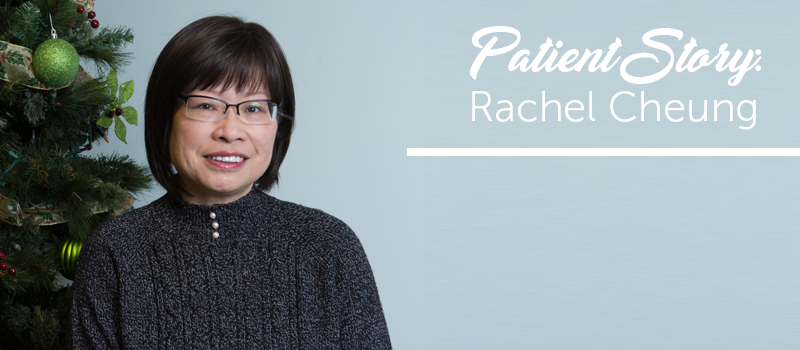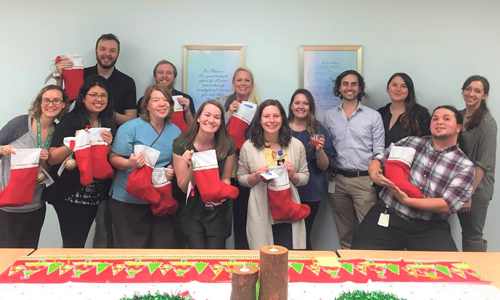New Mary Crowley App for Apple and Android
Immediate access to information has become a way of life, and the phones we consistently carry have become a major conduit for keeping us informed. Results from cancer research is among those subjects to become informed whether you are a treating physician, you know someone who has cancer or you are under treatment yourself.
One of our latest ways to keep you updated is through Mary Crowley’s new Phone App for Apple and Android phones. It provides immediate insight into the newest cancer immune and genomic therapy options for healthcare professionals as well as providing a tool for cancer patients to discuss with their physician. With an extensive search capability, the App is designed to find, navigate and share in-depth clinical trial information while containing all the necessary data for physicians to determine suitability for a patient. You may even call it “personalized” since therapies can be searched based on one’s particular gene mutation.
The National Cancer Institute suggests a clinical trial is a valuable option for consideration at any time during a cancer diagnosis. Download the free App and become informed about clinical trial options. It could save your life one day or that of someone you know!
• Search our real time database for trials by disease type, molecular profile or trial number
• Browse information on each trials objective, eligibility criteria and more
• Share clinical trial information through email or text message
• Contact a member of our research staff by phone or email
• Receive text notifications on new available trials
Hepatocellular Carcinoma
by Douglas W. Orr, M.D.
Physician Investigator
A relatively uncommon cancer in this country, primary cancer of the liver (also known as hepatocellular carcinoma or, when shortened, hepatoma) has been a frequently-seen malignancy within my medical practice at the Baylor University Medical Center. It is not uncommon for patients suffering from advanced cirrhosis who present to Baylor for consideration of a liver transplant to be found to have hepatoma, since cirrhosis, whatever its etiology, is the major risk factor for the development of hepatoma.
When found early—and if limited to no more than 3 spots within the liver—surgery or, in some circumstances, liver transplantation might be available and potentially curable. For more burdensome but still localized cancer, the threading of a flexible catheter from the groin into the hepatic artery can deliver (a) microscopic beads that obstruct the fine capillaries within tumors, thereby cutting off the blood supply to the tumor and eventually breaking down to release a toxic chemotherapy drug embedded within the beads into the tumor milieu—a process known as chemoembolization), or (b) tiny radioactivity-tagged beads (delivering radiation from the inside out) in order to thwart tumor growth or on occasion even to eradicate the cancer. However, for most patients, over time the cancer becomes more widespread within the liver or metastasizes to organs outside of the liver.
For these more advanced tumors, until recently, treatment options were quite limited, in that hepatoma does not respond well to chemotherapy. However, in the last several years there have been two significant developments:
1. Small molecule oral drugs known as tyrosine kinase inhibitor (TKI) drugs, which block the action of proteins that are otherwise supporting the cell’s capacity to divide and multiply. One particularly important mechanism of action is that of inhibiting the capacity of tumors to lay down new blood vessels to support further growth. Approved TKI drugs include sorafenib, lenvatinib, and cabozantinib, and as a second line drug, regorafenib.
2. Immune-mediated interventions, specifically a class of drugs called PD-1 inhibitors, that unmask immune-blocking mechanisms that the tumor utilizes to evade an immune attack. Approved drugs include nivolumab and pembrolizumab.
Since its inception, Mary Crowley Cancer Research has been at the forefront of efforts to embrace the explosion of new biological understandings of the genetic changes and molecular events that underlie cancer and thereby to advance new drug development, as typified by these TKI drugs and immune therapies.

Nephron [CC BY-SA 3.0 (https://creativecommons.org/licenses/by-sa/3.0)
PARP Inhibitors for Ovarian Cancer Patients
by Leah Plato PA-C, MPH, CCRP
Associate Director of Clinical and Scientific Affairs/PA
Nearly twenty-two thousand women will be diagnosed with ovarian cancer in 2018. While ovarian cancer accounts for only 2.5% of all female cancer cases in the United States, most are initially diagnosed with advanced disease that has spread throughout the abdominal cavity. The standard treatments for advanced ovarian cancer include surgery, chemotherapy, and targeted therapies.
However, developing research has continued to show the utility and clinical activity of poly (ADP-ribose) polymerase (PARP) inhibitors in the management of patients with epithelial ovarian cancer who have known mutations (germline or somatic) in BRCA.
Phase II and Phase III clinical trials have confirmed substantial biological and clinical activity for this class of antineoplastics in disease management. Further, there is evidence for the utility of PARP inhibitors in ovarian cancers in the absence of BRCA mutations (germline or somatic), presumably resulting from other molecular deficiencies in DNA repair.
Most recently, The New England Journal of Medicine published the results of SOLO-1. Newly diagnosed ovarian cancer patients who had a complete to partial response after platinum-based chemotherapy and having a mutation in BRCA1, BRCA2, or both (BRCA1/2) were tested with Olaparib (PARP inhibitor) as a maintenance therapy. After a two-year period, these patients achieved a significant improvement in progression-free survival. This reduced the risk of disease progression or death by 70% compared to the placebo group. These results bring in a new era in treatment for women with advanced ovarian cancer who carry the BRCA mutation.
Mary Crowley is pleased to offer a clinical trial with a PARP inhibitor. Clinical trial #17-16; A Phase Ib study to assess the safety, tolerability, and clinical activity of BGB-290 in combination with Temozolomide (TMZ) in subjects with locally advanced or metastatic selected solid tumors. Please reach out to Mary Crowley for further details on this clinical trial.
Welcome Ntombizodwa “Zoey” Sayi, MSN, RN, AGPCNP-BC

Ntombizodwa Zoey Sayi joined Mary Crowley in August 2018. She is an Adult Gerontology Primary Care Nurse Practitioner certified by American Nurses Credentialing Center (ANCC). Zoey graduated from University of Texas at Arlington with both her Bachelors and Masters of Science in Nursing. As an Oncology Certified Nurse (OCN) through Oncology Nursing Society (ONS), she has dedicated her career to the care of oncology patients and has worked with cancer patients for over a decade in the Dallas Metroplex Area. Zoey is currently a member of North Texas Nurse Practitioner Association and a welcome asset to our medical team.
Thank You,Big Hope!
Pictured: Mark Mestemacher, Eunice Na, Deborah Montonen, Lisa Mareschal and Mark Fletcher
Big Hope 1 raised over $170,000 at its Pushing HOPE Annual Marine Industry Charity Golf & Softball Tournaments August 16-18, 2018. Members of the barge industry gather from all over the country each year to participate in this highly-anticipated weekend and support Mary Crowley Cancer Research. The event included a welcome seafood boil Friday night, a golf tournament on Saturday, and softball and kickball tournaments Saturday and Sunday. Organizers also planned a 5k fun run for the first time, as well.
Big Hope 1 has been a generous supporter of Mary Crowley since 2012. This year’s event helped to bring the total amount raised for Mary Crowley to over $1 million. These funds have allowed Mary Crowley to bring even more clinical trials to waiting patients.
Colorectal Cancer Alliance Undy Run
Mary Crowley was the beneficiary of the 2018 Dallas/Ft. Worth Undy RunWalk held in Arlington on November 10. The Mary Crowley Crawlers participate in the run each year in honor of patients and loved ones. This year, Clinic Manager Michelle Richey even placed in the top of her age group.
The Colorectal Cancer Alliance has selected Mary Crowley as its Blue Hope Partner for 8 years running. As a result, Mary Crowley has been able to bring in clinical trials every year that serve colorectal cancer patients.
Dr. Delphinium
 Local florist Dr. Delphinium Designs + Events featured Mary Crowley as its December charity of the month. Every arrangement sent out by Dr. Delphinium included a card containing information about Mary Crowley and clinical trials. Thanks to Dr. Delphinium for helping to spread the word about Mary Crowley and its vital contributions to the cancer community!
Local florist Dr. Delphinium Designs + Events featured Mary Crowley as its December charity of the month. Every arrangement sent out by Dr. Delphinium included a card containing information about Mary Crowley and clinical trials. Thanks to Dr. Delphinium for helping to spread the word about Mary Crowley and its vital contributions to the cancer community!
Thank You, Jasper L. and Jack Denton Wilson Foundation!
Mary Crowley received a generous grant of $300,000 from the Jasper L. and Jack Denton Wilson Foundation to help expand patient access to clinical trials. These funds will allow Mary Crowley to continue its outreach to oncologists and cancer patients to educate the community about the importance of clinical trials and research that Mary Crowley conducts. The more aware doctors and patients are of the trials available at Mary Crowley, the more patients will be enrolled onto these trials, moving potential therapies one step closer to FDA approval.
Mary Crowley Cancer Research Gives Back
Representatives from the Mary Crowley data team and other departments volunteered at the Medical City Dallas Children’s Halloween Carnival in October. They hosted a Toy Story themed booth where kids could try to knock down cans, as well as a photo booth featuring props so kids could dress up like their favorite Toy Story characters.
Mary Crowley staff members gathererd together on December 19 to stuff stockings for inpatient oncology patients at Medical City Dallas. Forty stockings were filled with items such as activity/puzzle books, lotion, chapstick, hand sanitizer, snack/drink items and small holiday items to help spread some holiday cheer.
Patient Story: Rachel Cheung

Rachel Cheung is from Hong Kong, where she first met her husband while working together at the same company. They moved to North Texas 20 years ago when her husband was transferred for work. Today, Rachel is 58 years old and filled with such a vibrant and positive spirit, which emanates through her church volunteer work.
Her cancer story began when she experienced problems with her menstrual period at age 44. Two years later, her physician recommended she have a hysterectomy. Upon removal of her uterus, the pathology report showed her uterine tissue contained a smooth muscle tumor called Leiomyosarcoma. Her physician said she required no additional treatment at that time, as the tumor around the uterus had been removed.
Ten years later, in 2012, a re-occurrence of her cancer appeared. Rachel’s physician discovered a lesion in Rachel’s right lung and also found a mass in her left breast. She began treatment with chemotherapy, followed by surgery to remove part of her right lung and a portion of her left breast. Both lesions were determined to be Leiomyosarcoma that originated from
her uterine cancer. Following her surgery, Rachel continued with chemotherapy and radiation as her standard of care.
Things seemed to be going in a positive direction until 2016, when her oncologist found a lump in her lower back/gluteal area. It was three centimeters in size and removed by surgery, but, in December of that year, her oncologist once again discovered spots in her lung. At this point she travelled to San Antonio for treatment, but after experiencing several side effects, she stopped those treatments and began a combination treatment of Keytruda (an FDA-approved targeted therapy), chemotherapy, and monitoring.
In March of 2018, Rachel’s oncologist saw that her cancer had begun to grow. Rachel was referred to Mary Crowley Cancer Research in August and enrolled on a gene-targeted clinical trial designed to combat her BRACA 2 gene mutation. After her first therapy, she experienced fever of 103 degrees, chills and a low blood count, but after the dosage was adjusted, she is now stable and doing much better. And what a great Christmas present she received this year—her last two CT scans showed a 40-43% decrease in her cancer growth! Rachel is continuing with her clinical trial.
When asked about her experience at Mary Crowley, she says everyone at the clinic has treated her with such compassion and respect. Rachel said that she “feels the love of the staff” and she “loves them right back.”
Rachel and her husband live in McKinney and have two sons, ages 30 and 23. They also have two grandchildren – one two-year-old boy and a five-year-old girl. Rachel is an inspiration to us all and exudes the Mary Crowley tagline – “Hope Lives Here!”
Provide HOPE to cancer patients like Rachel: MAKE A DONATION






